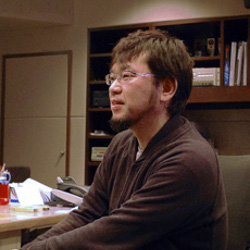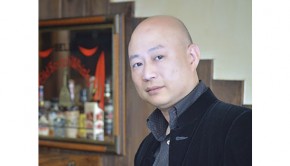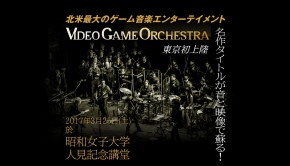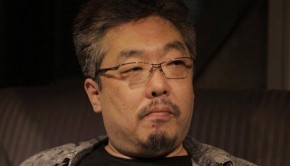Kenichi Tokoi Profile
 |
Also Known As: 床井健一 (とこいけんいち) / Dr.PRIS |
| Date of Birth: July 13, 1969 (Tochigi) |
|
| Residence: Tokyo |
|
| Game Works: Sonic, Phantasy Star, Yakuza 4 |
|
| Official Site: Sega |
History
| Organisation | Type | Tenure | Role |
| Sega (Sonic Team / Wavemaster) | Game Developer | 1996 – | Composer |
Biography
Kenichi Tokoi is a prolific composer at Sega best known for his contributions to the Sonic series. Born on July 13, 1969 in Tochigi, Tokoi started playing piano lessons during kindergarten and later became a member of a brass band. He started composing as he got older and, through imitating his favourite musicians, developed his musicianship. Inspired by Yellow Magic Orchestra, the artist performed synthesizer and bass guitar in bands at university in Tokyo and carefully considered his profession after graduating. While reading music magazines, he noticed that several game companies were recruiting. After compiling a demo tape, was accepted to Sega in 1996. Soon after joining, he felt intimidated by the high quality productions of senior employees such as Jun Senoue and Naofumi Hataya at the company. Nevertheless, he persevered to offer three satisfying dynamic rock contributions to the Saturn version of Daytona USA, and also explored Sega’s roots for the Genesis compilation Sonic Jam.
Tokoi achieved his breakthrough at Sega during 1999, taking major roles on three productions. On Let’s Make a Pro Baseball Team, he recreated the atmosphere of a sports arena with a range of jingles, sound effects, and voiceovers. Under the lead of Naofumi Hataya, Tokoi also offered a range of modern jazz and techno tracks on Space Channel 5, Tokoi worked under Naofumi Hataya to offer a range of modern jazz and techno tracks. Given the title was a dance music game, the artist placed an emphasis on rhythmical components to ensure gamers felt a strong groove. The composer took a more ambitious approach on the second part, always exploring new musical and technological possibilities. Also working on Sonic Adventure during 1999, Tokoi persevered to offer a lively accompaniment to the game with a wide range of instrumental tracks. The artist was also responsible for Knuckles’ charismatic vocal theme “Unknown from M.E.” and was involved in several productive collaborations with Jun Senoue, including the iconic “Open Your Heart”. He further pursued musical diversity on its sequel, offering cutting-edge instrumental themes, several pieces of cinematic underscore, and even a rap-based remix of Knuckles’ theme.
In 2003, Tokoi made his debut on the Phantasy Star series on Phantasy Star Online Episode III. He diverted from the series’ typical electro-orchestral hybrids in favour of referencing styles from a range of eras and cultures. The score was lavishly produced throughout and Tokoi even pioneered recordings with the Warsaw Philharmonic Orchestra. Following this success, Tokoi became a core part of the series’ internal music team, contributing to Phantasy Star Online Episode IV, Phantasy Star Universe, and the expansionAmbition of the Illiminus. Always one to surprise, his lavish and creative compositions and various sound effects on Phantasy Star Universe were particularly effective during a range of scenes. Also able to work in more technologically limiting environments, he took key roles on the scores for the Game Boy Advance’s Sonic Battle and Sonic Advance 3, before producing four electronic tracks on Sonic Riders. Also occasionally hired on external productions, he has written jingles for Marvelous Entertainment, composed the ending theme for the movie Jam Films, and edited music on the anime Astro Boy.
Having clearly shown tremendous range at Sega, Tokoi was promoted to the role of sound director on Sonic and the Secret Rings in 2007. Much of the score blended contemporary rock and electronic elements synonymous with Sonic with Arabian influences to represent the new setting. Tokoi maximised the potential of all the tracks for the game – ensuring they were meticulously composed, lavishly implemented, and carefully placed – using the pieces that he personally composed as a prototype to inspire other artists. Among his other innovations were to extensively integrated vocal tracks – with the help from singer-songwriter runblebee – through the gameplay. The subsequent year, Tokoi was appointed as the lead composer for Sonic Riders: Zero Gravity; building on the basis of the original score, he offered a range of electronic racing tracks and two uniquely styled vocal contributions that complemented the energetic gameplay and visual style. In guest contributions, Tokoi served as an arranger NiGHTS: Journey of Dreams, recording engineer of The Rub Rabbits, and assisting composer on Mario & Sonic at the Olympic Winter Games.
Tokoi recent took a large composing role on Sonic Unleashed, working closely with sound director Tomoya Ohtani. His world music experiments and rich stylistic fusions helped to make the settings of these games all the more unique, while his orchestrations brought considerable drama to the cutscenes. Appointed to the role of sound producer on Sonic Colors, Tokoi ensured the final product was colourful and refined from start to finish. In terms of his own compositions, the artist showed tremendous versatility once again and channelled a particularly personal jazz style.The artist went on to remix tracks from this game and Sonic Battle for Sonic Generations. Tokoi’s talents were also noticed by other Sega divisions and he was recruited as a guest composer on Yakuza 4; while the composer focused on matching the cool, raw image of the franchise with several hard funk tracks, he also brought depth to some of the softer scenes in the game. Tokoi’s latest credits were as an assistant composer on London Olympic Games and Phantasy Star Online 2.
References:
– Various Game & Album Credits
– VGMdb Discography
– Official Profile (Japanese, Archived)
– Interview with RocketBaby (English, July 2001)
© Biography by Chris Greening (September 2007). Last updated on January 20, 2013. Do not republish without formal permission.
Posted on January 20, 2013 by Chris Greening. Last modified on March 21, 2014.














